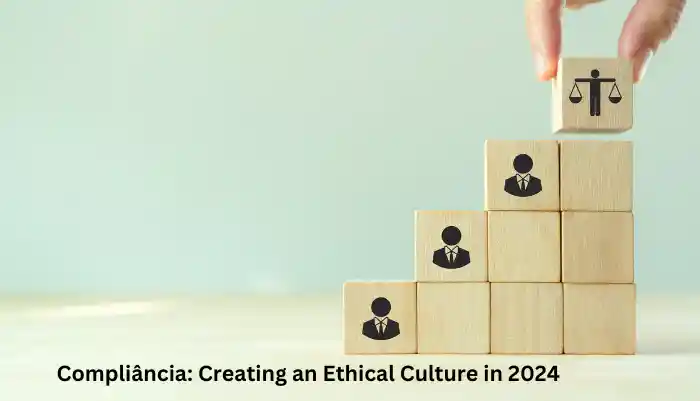Compliância: Creating an Ethical Culture in 2024
Compliância was just about following rules in the past, but now it’s more than that. It’s about going beyond what’s strictly required by law and focusing on ethics. Ethical Compliância Culture is about making ethics a central part of organizations’ daily work. It’s about allowing employees to speak up about ethical issues and building trust with everyone involved. Compliância helps organizations blend ethical principles into their operations smoothly. By embracing this culture and using Compliância, organizations can navigate challenges with integrity and ensure they thrive in the long run.
Building the Foundation
Establishing an ethical compliance culture involves more than mere rule-following; it entails instilling shared beliefs and principles guiding every decision. Defining core values forms the bedrock for sustainable “Compliância.” Leadership sets the example by demonstrating integrity and accountability while empowering employees to make ethical choices, which ensures active participation in upholding standards. This approach ensures that ethical “Compliância” is embraced by every organization member.
Definition and Importance Compliância
“Compliância,” which originates in the Portuguese word “compliâncian,” suggests a comprehensive organizational culture that centers on ethics, transparency, and responsible action. It extends further by simply adhering to the laws. This entails upholding legal norms and internal regulations, rules, and laws despite upholding ethical values that exceed them.
“Compliância” core values include proactive risk management and promoting responsibility and accessibility to the right people. Enhancing an organization’s image and confidence, securing against legal action and costs, ensuring the company’s future, taking an advantage in luring top talent, and enhancing business ethics through open systems and internal auditing are all evidence of why it is essential.
Compliância with Ethical Standards
“Compliância” (compliant) emphasizes moral behavior as crucial to building trust, integrity, and corporate success; it goes over only complying with the law. Ethical standards are essential because they permit quick solutions to tricky issues, enhance stakeholder trust, lessen risks, draw in top talent, and have good for society. “Compliância” must align with ethical standards, which means defining basic principles, integrating them into routine tasks, empowering staff, setting an example, inspiring reliability, and enhancing policies regularly in line with altering ethical norms.
Role of Compliância
“Compliância” (compliance) is essential for modern organizations, going beyond mere legal adherence to fulfill crucial functions. It acts as a shield by mitigating risks associated with non-compliance and protecting against legal, financial, and reputational harm. Additionally, “Compliância” serves as a compass, providing clear ethical guidance that fosters transparency and accountability in decision-making. Furthermore, it catalyzes success, contributing to sustainable growth, attracting top talent, and improving operational efficiency through streamlined processes. Overall, “Compliância” ensures organizations navigate regulatory complexities with integrity, resilience, and long-term prosperity.
Implementing “Compliância”

“Compliância” (compliance) is more than just a buzzword; it’s a blueprint for success. However, effectively implementing it requires a systematic approach. Here’s a tailored 5-step guide to steer you through the process:
-
Assess Your Risks:
Pinpoint the legal, ethical, and operational risks your organization encounters. Prioritize those with the highest potential impact and likelihood of occurrence. Take into account industry-specific regulations and emerging trends.
-
Establish a Framework:
Articulate your core ethical values and infuse them into your “Compliância” program. Craft explicit policies and procedures covering employee conduct, data privacy, and anti-corruption measures. Set up a reporting mechanism for ethical concerns and instances of non-compliance.
-
Educate and Empower:
Regularly provide training sessions for all staff members on your “Compliância” program, policies, and procedures. Foster an environment of open communication, encouraging employees to voice any concerns. Equip them with the necessary resources and tools to make ethical decisions confidently.
-
Monitor and Audit:
Consistently assess the effectiveness of your “Compliância” program through internal audits and evaluations. Analyze the allegations quickly and logically, and if necessary, take relevant penalties. Examine the audit results to find areas that want enhancement and put corrective actions on the spot.
-
Continuous Improvement:
In response to changing laws and hazards, constantly review and improve your “Compliância” program. To pinpoint areas that need improvement, analyze your program against industry standards and get outside input. Ensure “Compliância” eternal relevance and performance by integrating it into the culture and rules of your company.
Read More: https://asseturi.com/exploring-beliktal-journey-into-the-realm-of-myth-and-legend-in-2024/
Sustaining the Momentum

Building a robust Compliância program is crucial, but maintaining its momentum requires strategic approaches. Here’s a concise guide: Keep it Engaging: Update training materials, recognize ethical behavior, and foster open communication. To ensure continuous advancement, assess potential risks often, make updates in light of inputs, and make optimal use of innovation. Set an Example for Others to Follow: Act morally, convey expectations, and keep leaders responsible. Organizations can maintain the success of compliance activities by promoting ethical behavior and reducing risks by simply adhering to these metrics.
Developing Organizational Values
Establishing strong “Compliância” values within your organization is crucial for building an ethical culture. Here’s a straightforward plan to help you achieve this: Begin by gathering insights through stakeholder engagement, industry research, and legal considerations. Then, identify core values through brainstorming sessions and ensure they align with ethical standards. Incorporate these principles by making them known, incorporating them into procedures, and praising staff members who live up to them. Led by instance, promote direct communication and focus on hiring people who fit your values to create an optimal work culture. Finally, measure adherence, conduct regular reviews, and remain flexible in adapting to changes. By following these steps, you can establish a solid foundation for ethical behavior and long-term success.
Training and Education Initiatives
Practical “Compliância” training is crucial for fostering a culture of awareness and responsible decision-making within organizations. To achieve this, it’s important to tailor training programs based on specific roles and risks using engaging methods such as real-world scenarios. Emphasis should be placed on ethics and critical thinking, empowering employees to navigate ethical dilemmas effectively. Regular refresher sessions and integration into performance evaluations help maintain awareness while leveraging technology ensures efficiency in training delivery. This approach ensures that employees are knowledgeable and ethical, committed to upholding “Compliância” values.
Monitoring and Reporting Mechanisms
Effective Compliância relies on robust monitoring and reporting systems, essential for identifying risks and evaluating program effectiveness. This entails defining what areas to monitor, encouraging open communication for reporting, promptly addressing reported concerns, and continuously improving through regular reporting and benchmarking against industry standards. By following these steps, organizations can proactively manage compliance issues, promote integrity, and uphold accountability.
Assessing and Improving Compliância Culture
Creating a strong Compliância culture involves more than just following regulations; it requires instilling a commitment to ethical behavior and accountability throughout the organization. Organizations can use various assessment methods such as surveys, data analysis, benchmarking, observation, and open forums.
Specific efforts to improve, such as patching the identifying gaps, improving commitment to leadership, empowering staff, promoting continuous education, and praising ethical behavior, can be put into action based on the outputs of such audits. Through these strategies, businesses may establish a culture that values ethics, transparency, and legality.
Future Trends and Challenges Of Compliância
Organizations must keep ahead of developments in the ever-changing world of compliance by recognizing new trends and resolving critical concerns. They include a trend towards technology-driven compliance, a higher priority on privacy and data security, advancement, the integration of sustainable and ethical aspects into firm procedures, and the value of transparency.
Managing risks related to third-party partnerships, integrating technology successfully, staying abreast of regulatory changes, cultivating an ethical culture, and highlighting the upside of compliance efforts are complex tasks. Organizations should prioritize ongoing learning, making strategic technological investments, working with authorities and competitors, communicating openly with others, and maintaining an ethical workplace culture to prepare for the future.
Conclusion
Consequently, enterprises must maintain a proactive, flexible, and alert approach as the legal situation modifies. They can ensure compliance with laws and create a culture of honesty, openness, and moral behavior by embracing new trends, overcoming barriers, and planning for the future. Organizations can navigate the complexity of regulation and protect their long-term revenue, trust, and reputation in a constantly changing world with intelligent investments, collaboration, and open communication.
Click Here to read more about Asseturi.














Post Comment